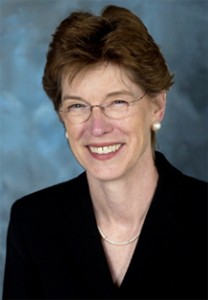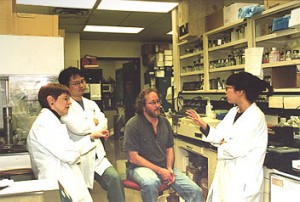February 2010 Scientist of the Month: Katherine L. Knight, Ph.D.
by Michelle Merrigan
 Dr. Katherine Knight is an immunologist and recently celebrated her 20th anniversary as chair of the department of Microbiology and Immunology at the Loyola University Chicago Stritch School of Medicine. To celebrate this anniversary, alumni and colleagues returned to Loyola for a symposium to share their recollections of Dr. Knight and her role in their development as scientists. The theme was “20 Years of Doing It Together”, which is appropriate because Dr. Knight has always emphasized that science is about relationships. “Everyone is a mentor to somebody,” she says.
Dr. Katherine Knight is an immunologist and recently celebrated her 20th anniversary as chair of the department of Microbiology and Immunology at the Loyola University Chicago Stritch School of Medicine. To celebrate this anniversary, alumni and colleagues returned to Loyola for a symposium to share their recollections of Dr. Knight and her role in their development as scientists. The theme was “20 Years of Doing It Together”, which is appropriate because Dr. Knight has always emphasized that science is about relationships. “Everyone is a mentor to somebody,” she says.
The mentoring relationship between faculty members and students is at the core of the department’s educational focus. As chair, Dr. Knight has put in place programs that help students recognize and develop positive mentoring relationships. For example, at the annual department retreat, new students participate in discussions about choosing a graduate advisor. Dr. Knight advises students to choose someone that they are going to enjoy interacting with personally. She points out that everyone has different needs. “Some PI’s are more directive, and some students need more direction than others.” Ideally, a mentor should be able to respond to whatever the student requires. She suggests students choose based on the environment of the laboratory, not necessarily on the project.
Dr. Knight holds regular informal meetings to discuss any issues students choose, which can range from how to find a post-doctoral fellowship to tips on making effective PowerPoint slides for lectures. Indeed, the department has a strong focus on communication skills, which Dr. Knight feels are the most important skills to acquire outside of designing a sound experiment. All first year students participate in a special course dedicated to learning speaking and presentation skills. This gives all students a core competency on which they and their graduate advisors can build. She emphasizes always adapting your talk to your audience, and maintaining a “teaching frame of mind.”

Dr Knight has shared her philosophy of mentoring with the department on multiple occasions. She particularly emphasizes that a good mentor sees what the student/mentee needs, rather than his or her own needs as an advisor. She admits that in the current academic climate, mentors have their own pressures to publish and be productive, and yet at the same time must allow the student time to develop his or her own scientific mind. She advises new faculty on balancing the personal motives of productivity and the care-giving motives involved in mentoring students. She insists that these motives need not be mutually exclusive. “There’s a study that shows that for people who have been well-mentored, their institutions are much better off because those people stay.” Dr. Knight also prepares senior students for the transition to being mentors themselves, saying, “If you’ve been treated well, you will subsequently treat other people well.”
On January 22, 2010, Dr. Knight gave a presentation on mentoring at the annual meeting of the Association of Medical School Microbiology and Immunology Chairs. Not only did this event occur during National Mentoring Month, but also the day on which she gave the talk was “Thank Your Mentor Day”. At the symposium in May 2009, a group of colleagues, alumni and students established the Katherine L. Knight Fund for Mentoring in honor of her guidance and mentorship. In keeping with her philosophy of adapting to whatever the mentee needs, this fund will be used to enhance the mentoring experience for students, whatever form that might require, such as student travel or professional development programs.
Nomination and article submitted by AWIS Chicago Staff Writer Michelle Merrigan. Ms. Merrigan is a PhD candidate in the Microbiology and Immunology Department at Loyola University Chicago’s Stritch School of Medicine. Her research focuses on the pathogenesis of the bacterium Clostridium difficile. After graduation, she hopes to pursue a career in scientific writing or communications.
*Know a scientist you think should be featured in an upcoming “Scientist of the Month” article? Send nominations to Jessica Reimer. Your nominee does not need to be an AWIS member or a woman, but should promote the advancement of women in science, technology, mathematics and engineering.
Want to keep yourself up-to-date on AWIS Chicago activities? Follow AWIS Chicago on Twitter! You can request to be added to our listserve by clicking here, and join the AWIS Chicago group on LinkedIn and Facebook by clicking the icons on the bottom right of this page.
